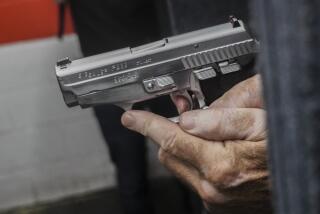Criminal defendants find an unlikely friend in Justice Scalia
Reporting from Washington — Justice Antonin Scalia, the Supreme Court’s most outspoken and combative conservative, is not often described as friendly to criminals.
But in recent years, Scalia has led an unusual pro-defendant faction at the high court in reversing convictions for murder, drug dealing, wife beating and drunken driving.
Next up in early December is a Chicago rapist who claims his 6th Amendment right to confront his accusers was violated because prosecutors did not put on the witness stand a lab technician from Maryland who conducted the DNA test that sent him to prison.
This claim might have been a loser even during the court’s long-past liberal era. But with the relentless Scalia leading the charge, it may well succeed, a prospect that worries prosecutors and crime lab directors across the nation.
Sometimes, Scalia’s insistence on following the “original” Constitution leads to unexpected results. And for him, there are no shades of gray and no halfway measures.
The 6th Amendment to the Constitution says the “accused shall enjoy the right … to be confronted with the witnesses against him.” To Scalia, this clause not only gives defendants the right to challenge actual witnesses, but also the right to bar testimony from all those “witnesses” who did not or cannot testify in court. He takes this view even if the witness is dead.
Three years ago, Scalia led the court in reversing the murder conviction of a Los Angeles man who shot and killed his girlfriend. A police officer testified the victim had reported that Dwayne Giles threatened to kill her. Scalia said that testimony violated Giles’ rights because he could not confront or cross-examine her.
“We decline to approve an exception to the Confrontation Clause unheard of at the time of the founding,” Scalia said for 6-3 majority. This went too far for liberal Justices John Paul Stevens and Stephen G. Breyer.
Two years ago, Scalia spoke for a 5-4 majority reversing the conviction of an alleged cocaine dealer from Massachusetts because prosecutors did not bring to court a lab analyst whose test confirmed the bags of white powder were indeed cocaine. The dissenters, including Chief Justice John G. Roberts Jr. and Justices Anthony M. Kennedy and Samuel A. Alito Jr., said a lab technician who conducts a test is not a “witness” in the ordinary sense of the term.
In June, the court went one step further. The Scalia bloc, by a 5-4 vote, overturned the drunken-driving conviction of a New Mexico man because the lab analyst who testified about his blood alcohol did not actually work on the defendant’s blood sample. He put together an odd-couple coalition with Justices Clarence Thomas, Ruth Bader Ginsburg, Sonia Sotomayor and Elena Kagan.
“This is not a left-right split. This is principle versus pragmatism,” said University of Michigan law professor Richard Friedman. For Scalia, “this is all about adhering to originalism,” regardless of whether the results seem strange.
Scalia’s reliance on the original meaning of the Constitution is usually described in simple terms. For example, because the Constitution says nothing about abortion, he says the Roe vs. Wade decision legalizing it was wrong and should be overruled.
But in many constitutional disputes, the precise, original meaning of a particular word — such as “witness” — is none too clear. In the case of the Chicago rapist, the court will decide whether one or more crime lab technicians who conducted a crucial test must testify or whether an expert who reviews their work can serve as the witness for the prosecution.
It began when a 22-year old woman returning home from her job in downtown Chicago was grabbed by a man and raped in his car. She was taken to a hospital, and swabs from her examination were sent to a Cellmark lab in Maryland. Six months later, that lab sent back a male DNA profile.
Sandra Lambatos, a scientist at the Illinois police crime lab, ran a computer search and found a match with Sandy Williams, a suspect already under arrest. The rape victim later identified Williams as her assailant.
At his trial, Lambatos testified and explained how she did the match. A lawyer for Williams objected, citing Scalia’s opinion and arguing that his client had a right to “confront” the Cellmark technicians who put together the DNA profile.
The judge disagreed. Williams was convicted and sentenced to life in prison. But in June, the Supreme Court voted to hear the case of Williams vs. Illinois.
Prosecutors say they worry about a ruling requiring testimony from all the experts who worked on a crucial test. “DNA is an assembly-line process. Do you want every person to testify?” asked W. Scott Thorpe, head of the California District Attorneys Assn. “What do you do about a ‘cold case?’” he added, when the medical examiner who did an autopsy decades ago is no longer available to testify.
More to Read
Get the L.A. Times Politics newsletter
Deeply reported insights into legislation, politics and policy from Sacramento, Washington and beyond. In your inbox three times per week.
You may occasionally receive promotional content from the Los Angeles Times.











